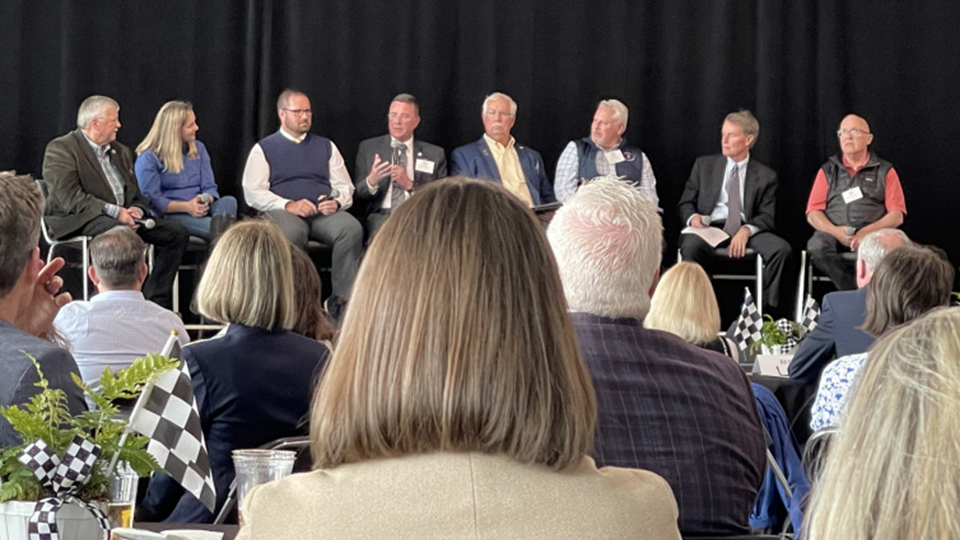Central Indiana mayors discuss how region can compete through cooperation
Subscriber Benefit
As a subscriber you can listen to articles at work, in the car, or while you work out. Subscribe Now
Eight central Indiana mayors met Thursday night at Indianapolis Motor Speedway to discuss how regional collaboration can help the metropolitan area compete nationally for economic development projects.
Mayors Steve Barnett of Franklin, Dennis Buckley of Beech Grove, Steve Collier of Lawrence, Tom DeBaun of Shelbyville, Joe Hogsett of Indianapolis, Chris Jensen of Noblesville, Mark Myers of Greenwood and Emily Styron of Zionsville participated in the Indy Chamber’s Meet the Mayors 2023 event.
They answered questions from IBJ Media CEO Nate Feltman, who is publisher of the Indianapolis Business Journal.
Here are four major topics the mayors covered.
READI grants and RDAs
Indiana leaders have focused on regionalism in recent years as a way to spur economic development across the state through initiatives that include the Regional Economic Acceleration and Development Initiative, which provides opportunities for communities join together and apply for grant funding.
“The READI grant process that the state has offered and that we are all participating in has given us an option to think through how we can join our communities not just through roads, but through trails and pedestrian and bicycling options,” Styron said. “I think that’s great for attracting our adult children back to their hometowns, giving them the amenities that they’re looking for in other communities.”
In 2020, Gov. Eric Holcomb signed Senate Enrolled Act 350, which authorized counties and municipalities in the Indianapolis metropolitan area to create a new regional development authority.
Jensen, along with Fishers Mayor Scott Fadness, led the push to create the Central Indiana Regional Development Authority, which includes Anderson, Beech Grove, Carmel, Fishers, Indianapolis, Lawrence, McCordsville, Noblesville, Speedway, Westfield and Zionsville.
There are also RDAs that cover the northern, southern, northeast and southwest regions of the state.
“If any one of us on this stage are competing with one another for an economic development opportunity, we’ve already won. Our region has already won,” Jensen said. “We’re not competing with each other. We’re competing with Nashville, Minneapolis, with Denver, with Columbus (Ohio). That’s where we’re competing against.”
Higher education opportunities
Hogsett called the planned uncoupling of IUPUI, giving Indiana University and Purdue University their own identities in Indianapolis, a “gamechanger” in developing and retaining talent in central Indiana.
Most of the urban campus will be rebranded Indiana University Indianapolis, while Purdue plans to expand its presence in the coming years on or near the Indianapolis campus.
The two schools plan to work together to harness their life science and health care programs—including the IU School of Medicine and Purdue Weldon School of Biomedical Engineering—in an informal biosciences engineering institute.
“This brings tremendous potential to the city in terms of the talent pipeline,” Hogsett said. “Economic development in the 21st century is fundamentally different than it’s ever been before. The talent will drive the business, not the other way around.”
In February, Franklin College dedicated its new Center for Tech Innovation, which school officials say will serve as the hub for its newly-created digital fluency initiative, providing collaboration and workspace for students, faculty and staff.
The facility includes a 3-D printer, makerspace, podcast studio, virtual reality space and headsets, and other resources necessary to produce graduates who are tech fluent.
Barnett said the center will train students to meet the growing information technology needs of the region.
“I think we see the shift from more manual labor to IT in our factories, warehouses, and we want higher income jobs,” Barnett said.
Ready to build
Jensen noted the importance of having shovel-ready sites available to attract companies that want to build new headquarters and facilities, even if it’s a switch in strategy from what he and other mayors previously knew.
In Noblesville, those sites include Innovation Mile—a 400- to 500-acre master-planned district along East 141st Street between Olio and Cyntheanne roads.
“The state of economic development is so different than it used to be,” Jensen said. “I struggle with this because I don’t believe government should be a landbank, and I think we have to be very careful when we go out and assemble massive swaths of land as a government entity that we’re doing so with the proper vision in place for that land and that we have that land ready and that it has utilities available and it’s shovel-ready so that we can flip that quickly in order for the taxpayer to get their investment and their value back to them.”
Noblesville also used its abundance of available land to attract Bastian Solutions, which is planning a $140 million corporate campus that will include a new corporate headquarters and manufacturing plant.
“They wanted to have a corporate campus not just for the next 10 or 15 years, but for the next 30 or 50 years,” Jensen said. “And, so, I think what the Indy region has that’s competitive over others is space, talent and a willingness to partner.”
Public transit expansion
Collier said IndyGo’s $188 million Purple Line expansion will bring new opportunities for people in Lawrence and in the communities it will pass through.
Plans call for the Purple Line to run from downtown to the Ivy Tech Community College campus just south of Fort Harrison State Park, in the heart of Lawrence.
The new bus service is expected to be complete by fall 2024 and provide some of the city’s most distressed neighborhoods along the East 38th Street corridor and northward with better access to jobs, groceries and safe travel.
“The economic development that’s on either side of the Purple Line coming through is going to mean big things for Lawrence,” Collier said.
